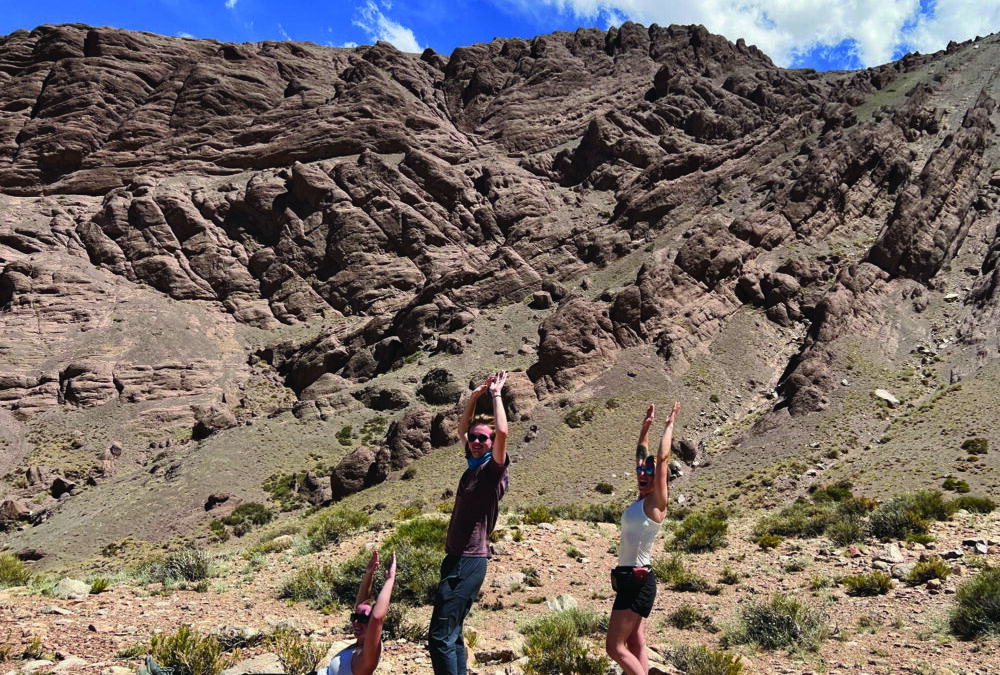Shaye Phillips, Asst. Features Editor–
The loud whirring of the engines and the monotonous chatter of passengers fades into the background as Chelsea Mackaman-Lofland peers out of a tiny, box-shaped window. Chelsea’s parents decided to move from Florida to Washington State when she was 8 years old and this is her first time on a plane.
As the flight is pulling into Seattle, Mackaman-Lofland marvels at a gigantic Pacific volcano that can only be viewed from the right side.
“To me it was like this giant pimple sticking out of the earth that was snow-covered and I was like what is that? How did it get there? I wanna go there.”
The volcano was Mount Rainier, a large active stratovolcano located in the Cascade Range of the Pacific Northwest. This served as her first formal introduction to plate tectonics.
Fast forward fifteen years, Mackaman-Lofland did her undergraduate research at The University of Washington in Seattle. She conducted multiple studies on Mount Saint Helens, and over the course of this research, shifted her focus from volcanoes to studying the movement of tectonic plates.
“You’d have to do a bunch of fluid dynamics to understand magma rising in a volcano at a very high research level, and I was less interested in the chemistry and more interested in the physics.”
This is why Mackaman-Lofland considers herself an applied physicist, and in some ways, an engineer.
After getting her PhD at the University of Texas, Mackaman-Lofland joined Denison in 2022 as an assistant professor for the earth and environmental studies department. She teaches the introductory course to environmental science: Planet Earth 111. She also taught Earth Structures 311 and Global Tectonics 370.
The next fall semester, she will be teaching a course called Introduction to Field and Lab Methods, a 200 level course that will teach students how to conduct field studies and gather data related to environmental science.
Part of the reason Mackaman-Lofland was so excited about teaching at a place like Denison stems from her own personal love of learning.
“I love learning, I love learning with people, and I like thinking about the different ways people think and gain knowledge… People learn so differently and it is so much fun to get that different perspective,” Mackaman-Lofland said.
The other reason why she feels passionate about teaching environmental science is due to its relevance in today’s society.
“We’re at a time in Earth’s history where humans are having a major impact on the planet, and I love teaching Planet Earth specifically because our world needs people who understand earth and environmental sciences.”
It also does not hurt that being an environmental science professor comes with its share of fun opportunities. Mackaman-Lofland shows great enthusiasm for all the field trips she has gotten to experience, with the Mojave Desert trip in 2023 and this past spring break’s trip to the Grand Canyon being some of her favorites.
According to Mackaman-Lofland, the trip that topped all of them was the Anderson Summer Scholars trip she took to Argentina last summer with two of her students. Mackaman-Lofland has been studying in Argentina for 10 years as part of her PhD, and as a result has formed many professional and personal relationships with people there.
It was a special trip for Chelsea as she watched these students build lasting memories in a place that had originally encouraged her to be an earth science professor.
“It was so special to get to take students to this place that taught me so much and get to see them have this totally transformative, international field trip experience that is exactly the kind of thing that got me into earth science and made me want to be a professor,” she said.
Some other interesting facts about Mackaman-Lofland is she has two adorable cats, named Bernard and Elizabeth, whom she adoringly calls Ma’am. She gained an interest in rock climbing and mountaineering through her studies in high school and college. In general, she is a huge fan of anything rock related.
“If you wanna get me talking about anything you can bring up rocks of any type: rock music, rocks, geology, rock climbing,” Mackaman-Lofland said.
Editor’s Note: The professor spotlight is a recurring feature. Email [email protected] if you would like to suggest a professor to be featured.

